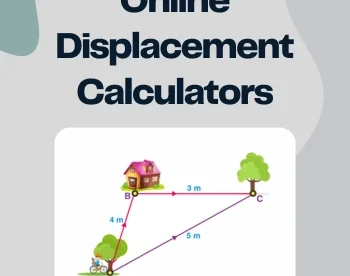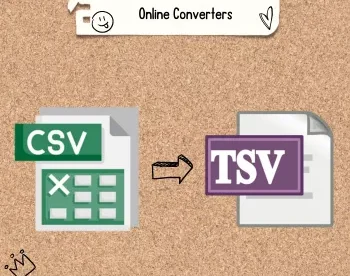6 Best Free Online Twitter Engagement Rate Calculator Websites
Here is a list of the best free online Twitter engagement rate calculator websites. The engagement rate is a metric to determine performance on social media. In the case of Twitter, the engagement rate can help you determine how well your tweet or profile is doing. You can calculate the engagement rate of an individual tweet or an entire Twitter account.
This post covers 6 websites where you can calculate Twitter engagement rate. It is a mix of calculators that perform tweet engagement calculation, profile engagement calculator, and/or both. Some calculators give ask for entire profile stats and determine the overall account engagement. Whereas, some keep the inputs to engagements and impressions for quick tweet engagement calculation. But you can always replace the impressions with followers to get the profile engagement rate as well. With that said, let’s go through the post and explore these calculators.
My Favorite Online Twitter Engagement Rate Calculator
TheOnlineAdvertisingGuide.com is my favorite website on this list to calculate the Twitter engagement rate. This calculator can perform reverse calculations to determine engagements or impressions from the engagement rate. It also provides an industry engagement chart that you can use for self-benchmarking.
You can check out our other lists of the best free Facebook Engagement Rate Calculator Services, Online Instagram Engagement Rate Calculator Websites, and Online Instagram Influencer Earnings Calculator Tools.
Comparison Table:
| Name | Input Type | Calculates from |
|---|---|---|
| TheOnlineAdvertisingGuide.com | Profile metrics | Engagement + Impressions |
| CalculatorPack.com | Profile metrics | Profile/tweet stats |
| Rows.com | Profile metrics | Profile/tweet stats |
| Swonkie.com | Profile metrics | Engagement + Impressions |
| Calculator.academy | Profile metrics | Engagement + Impressions |
| Mention.com | Twitter username | Engagement + Impressions |
TheOnlineAdvertisingGuide.com
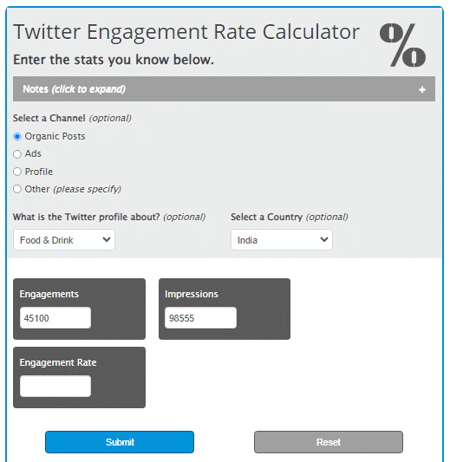
TheOnlineAdvertisingGuide.com provides a free online Twitter Engagement Rate Calculator. This free tool can help determine the engagement rate of your Twitter channels. The calculator has three input parameters; Total Engagements, Total Reach, and Engagement Rate. You can add any two to calculate the third one. Along with that, there are a few optional fields covering Twitter channels (organic post, ad, profile, etc,), industry, and country. These parameters are used to benchmark the engagement with the industry. However, it does not work like that for Twitter. The calculator does not show any direct benchmarking comparisons for Twitter engagement. But it does show a benchmarking engagement chart that you can use to compare your Twitter engagement and benchmark yourself.
Highlights:
- This calculator can be used for Posts, Ads, Profiles, and others.
- It calculates the engagement rate from total engagements and total reach.
- It shows an engagement benchmark chart based on the current average.
- The tool also covers the Engagement Rate formula with explanations.
CalculatorPack.com
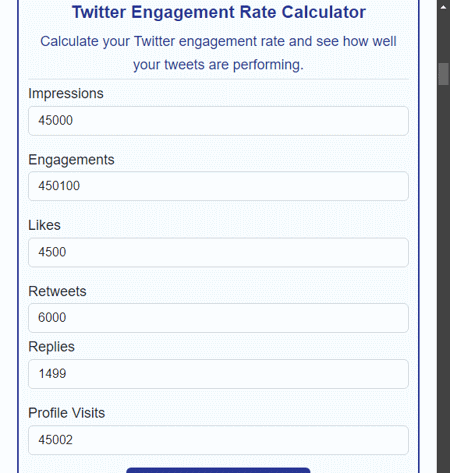
CalculatorPack.com is a free website with a Twitter Engagement Rate Calculator. You can use this tool to calculate your Twitter engagement rate and see how well your tweets are performing. The tool has several input fields asking for Impressions, Engagements, Likes, Retweets, Replies, and Profile Visits. You simply have to provide this information. After that, you can run the calculator to determine the engagement rate. It shows the calculated engagement rate right below along with a list of all the added parameters. It also provides a link that you can use to share the calculation online with others.
Highlights:
- This calculator determines engagement based on various profile and post metrics.
- It generates a link that you can use to share the calculations.
Rows.com
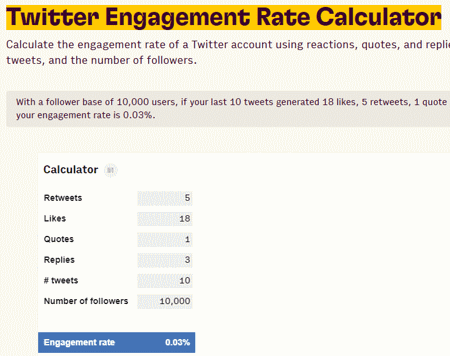
Rows.com is another free website with an online Twitter engagement rate calculator. This calculator calculates the engagement rate of a Twitter account using reactions, quotes, and replies to a set of tweets, and the number of followers. You can simply fill in all the asked parameters and instantly see the engagement rate for the added data. This calculator is basically a spreadsheet that you can open in full. From there, you can access a few additional features. You can download the calculations as a CSV file. This comes in the form of tabular data. You can also access and copy the embed code of the calculator that you can use to add this calculator to your websites or blogs.
Highlights:
- This simple calculator estimates Twitter engagement based on tweet stats and followers.
- You can get the embed code of the calculator and download the calculation as a CSV file.
Swonkie.com
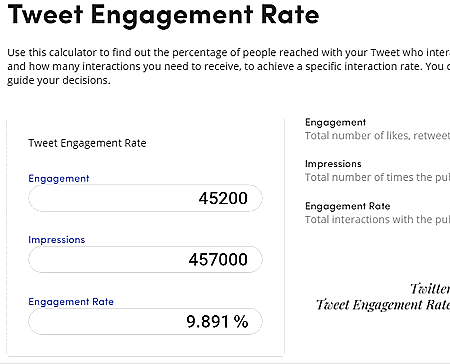
Swonkie.com offers a collection of online engagement rate calculators. It covers calculators designed for Twitter, Facebook, Instagram, LinkedIn, and more. There are multiple calculators for each platform. For example, in the case of Twitter, there are Tweet Engagement Rate Calculator, Buzz Rate Calculator, Profile Engagement Rate Calculator, and Followers Ratio Calculator. You can simply pick the calculator that you want to use. Depending on the selected calculator, you have to fill in the data and perform the calculation. The Tweet Tweet Engagement Rate Calculator determines engagement rate from engagement and impressions. Whereas the Profile Engagement Rate Calculator determines engagement rate from engagement and followers.
Highlights:
- This website has a collection of calculators for engagement rate calculations.
- It has Tweet Engagement Rate Calculator and Profile Engagement Rate Calculator.
- Each calculator comes with a brief explanation and formula used.
Calculator.academy
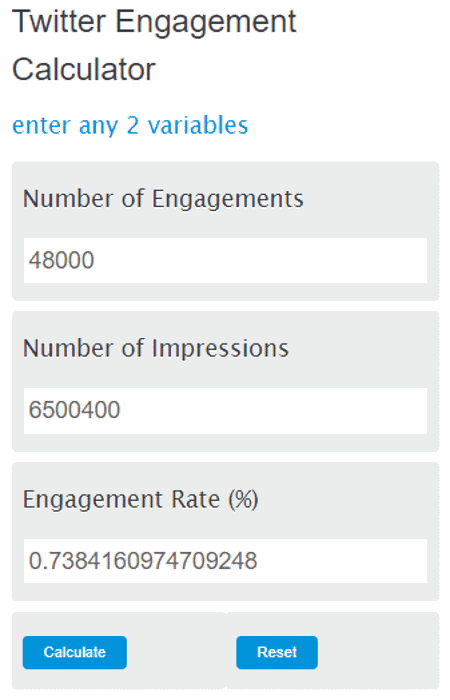
Calculator.academy is a website with free online calculators. This website offers a variety of calculators covering maths, science, fitness, finance, social media, and more. It has a Twitter Engagement Rate Calculator which is similar to many other engagement rate calculators featured on the site. This calculator determines the engagement rate from engagements and impressions. You can simply add your data and perform the calculation. It also works in reverse. If you know the engagement rate along with one other parameter, you can easily calculate engagements/impressions.
Highlights:
- This calculator calculates the engagement rate from total engagements and impressions.
- It shows an engagement rate formula covering the FAQs as well.
Mention.com
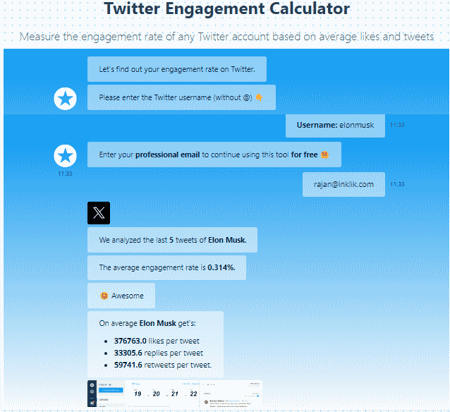
Mention.com has a Twitter engagement rate calculator that calculates the engagement of a Twitter Profile. This calculator does not ask for the raw data inputs. Instead, it asks for the Twitter username. When you provide a valid username, it fetches the requirement data from Twitter and then gives you the engagement rate of that Twitter account. Along with the engagement, it also shows “likes per tweet”, “replies per tweet”, and “retweets per tweet”. This can help you get an idea of the post engagement of that account. The downside of this calculator is that it collects business emails. To perform the calculator, you have to provide a business email address (no verification required). It shows the results on the same page though.
Highlights:
- This calculator determines the engagement of a Twitter account from a username.
- It also covers additional profile averages such as post-average engagement.
- It requires a business email address to perform the calculation.
Frequently Asked Questions
The Twitter engagement rate is calculated by dividing the total engagement by the total reach. It is usually expressed as a percentage so you have to multiply the quotient by 100.
On Twitter, the term "1 engagement" refers to a single interaction with a tweet. An engagement includes various actions taken by users, such as liking, retweeting, replying, or clicking on the tweet. So when you see "1 engagement" on a tweet, it means that the tweet has received one interaction from a user, which could be a like, retweet, reply, or click.
Yes, a 7% engagement rate on social media, including Twitter, is generally considered good. It indicates that 7% of the audience is actively interacting with the content, which is above-average and signifies a positive response to the posts or tweets.
The formula for engagement rate is engagement divided by actual reach and multiplied by 100.
A good engagement rate on Twitter can vary depending on factors like the size of your following, industry, and the type of content you share. However, as a general guideline, an engagement rate of 1% to 3% is considered decent, while rates above 3% are considered good, and rates above 5% are excellent. Higher engagement rates indicate that a significant portion of your audience is actively interacting with your tweets, which is a positive sign of audience interest and involvement.
About Us
We are the team behind some of the most popular tech blogs, like: I LoveFree Software and Windows 8 Freeware.
More About UsArchives
- May 2024
- April 2024
- March 2024
- February 2024
- January 2024
- December 2023
- November 2023
- October 2023
- September 2023
- August 2023
- July 2023
- June 2023
- May 2023
- April 2023
- March 2023
- February 2023
- January 2023
- December 2022
- November 2022
- October 2022
- September 2022
- August 2022
- July 2022
- June 2022
- May 2022
- April 2022
- March 2022
- February 2022
- January 2022
- December 2021
- November 2021
- October 2021
- September 2021
- August 2021
- July 2021
- June 2021
- May 2021
- April 2021
- March 2021
- February 2021
- January 2021
- December 2020
- November 2020
- October 2020
- September 2020
- August 2020
- July 2020
- June 2020
- May 2020
- April 2020
- March 2020
- February 2020
- January 2020
- December 2019
- November 2019
- October 2019
- September 2019
- August 2019
- July 2019
- June 2019
- May 2019
- April 2019
- March 2019
- February 2019
- January 2019
- December 2018
- November 2018
- October 2018
- September 2018
- August 2018
- July 2018
- June 2018
- May 2018
- April 2018
- March 2018
- February 2018
- January 2018
- December 2017
- November 2017
- October 2017
- September 2017
- August 2017
- July 2017
- June 2017
- May 2017
- April 2017
- March 2017
- February 2017
- January 2017
- December 2016
- November 2016
- October 2016
- September 2016
- August 2016
- July 2016
- June 2016
- May 2016
- April 2016
- March 2016
- February 2016
- January 2016
- December 2015
- November 2015
- October 2015
- September 2015
- August 2015
- July 2015
- June 2015
- May 2015
- April 2015
- March 2015
- February 2015
- January 2015
- December 2014
- November 2014
- October 2014
- September 2014
- August 2014
- July 2014
- June 2014
- May 2014
- April 2014
- March 2014

